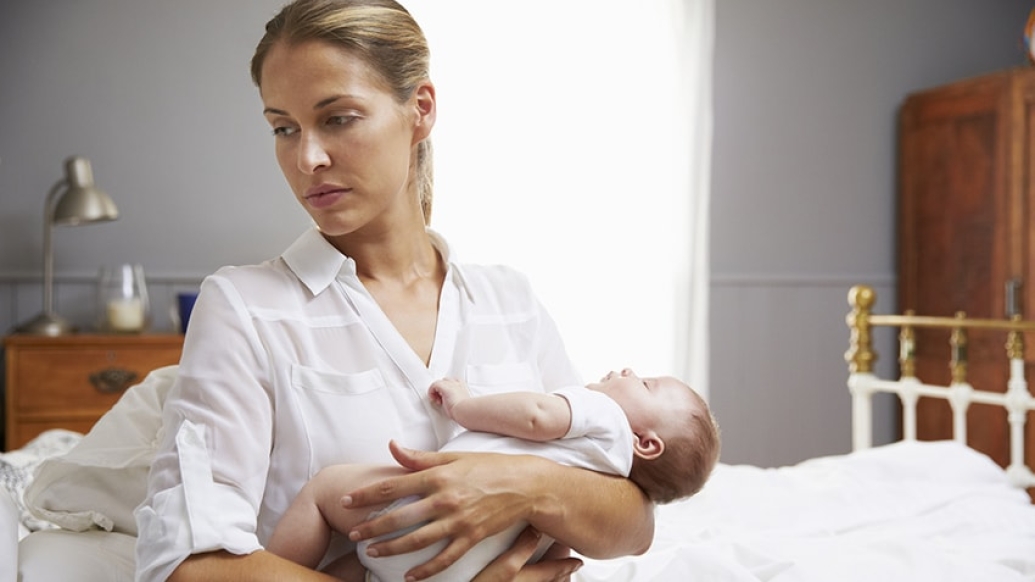For some parents, nights up with a newborn can morph into clinical insomnia — a risk factor for postpartum depression. Know when to seek help.
10:31 PM
Author |

I often refer to the perinatal period, or the time immediately before and after birth, as a perfect storm for insomnia, which greatly increases the risk for postpartum depression.
Stress and life changes, positive or negative, are the biggest triggers for insomnia. So the arrival of a new baby, even under the best of circumstances, is a likely trigger. Other changes, such as the major drop in reproductive hormones (which influence the body clock), and a shift for the brain to be more alert to listen for the baby, can also fuel chronic sleeplessness.
SEE ALSO: 3 Reasons Women Are More Likely to Have Insomnia
At the same time, poor sleep quality and insomnia — difficulty falling asleep when the baby is sleeping, or getting back to sleep after waking to care for the baby — are well-established risk factors for postpartum depression.
At-home fixes for insomnia after childbirth
Once insomnia has started, women may change their routine to cope with sleep loss. But these habit changes actually end up perpetuating sleeplessness.
Unhealthy bedtime behaviors include spending long periods in bed when frustrated or anxious and "trying" to sleep; inconsistent bed and wake times (usually because moms are timing their sleep to the infant, who doesn't yet have a circadian rhythm); and thinking in bed (I hear from many women that this is the only uninterrupted time they have to themselves).
Finally, postpartum women do not get a lot of bright light during the day, and they often get too much light during the night when caring for their baby, which can confuse their body's internal clock.
Practicing sleep-positive behaviors may help.
In general, we recommend that people do not "try" to sleep, because sleep is not under our direct control. Instead, if you are unable to sleep, go to another room and do something quiet and relaxing in dim light, and don't return to the bed until you feel sleepy.
Avoid technology or any device that will emit bright light into your face starting one to two hours before bed and during the night.
You could also think about forming a plan during late pregnancy for how nighttime infant care can be shared with partners or family members whenever possible. A new mother's sleep should be prioritized; she really needs her sleep to recover from the major physical stress of childbirth.
When to see a professional for sleeplessness
It's normal for new parents to experience significant sleep deprivation and fragmentation.
SEE ALSO: What Parents Should Know About Safe Swaddling
In fact, because they are sleep deprived, new parents are typically able to fall asleep or return to sleep quickly when they have the opportunity.
But because of the link between postpartum depression and insomnia, not to mention the other health concerns of a lack of sleep, it's important to monitor behavior and know when to seek help.
Difficulty falling asleep or returning to sleep when the baby is asleep, when lasting for more than a few weeks, is a signal to involve a professional.
Fortunately, we have good treatments, including nonmedication therapies that can help postpartum women get their sleep back on track. Cognitive-behavioral therapy for insomnia is our gold standard treatment—a very effective, brief therapy focused on changing behaviors to improve sleep.
Sleep loss is a common, normal experience after the arrival of a baby. However, if you develop difficulty falling asleep or returning to sleep, you should seek help. Tackling sleep problems as soon as possible may help to reduce the risk of postpartum depression.

Explore a variety of health care news & stories by visiting the Health Lab home page for more articles.

Department of Communication at Michigan Medicine
Want top health & research news weekly? Sign up for Health Lab’s newsletters today!





